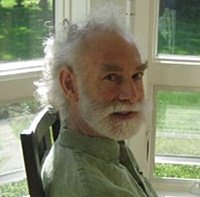POLITICAL
by Peter Leight
Political
Today I got up in the morning and started promising everything I could think of,
together with some things I’ve never even thought of,
it makes me feel political,
I’m looking in the mirror to see what I look like
when I’m making a point—
I think it’s a kind of screening, as when you watch a program to see what’s going to happen.
Paving the way,
just listen to yourself.
It’s still early,
I’m making myself some bacon and eggs, because they get along with each other in spite of their
differences,
right next to each other
or on top of each other,
the yolk running into the sputtering bacon in spite of their different appearances and disparate
origins,
bacon and eggs or eggs and bacon,
and as soon as I finish eating I’m going to spend what I don’t have,
I’m not thinking about myself,
I mean I’m thinking about myself but honestly the main thing is the best for the greatest
number—
sometimes you can’t afford to
but you can’t afford not to.
I know it’s political because it’s the type of benefit that doesn’t cost anything,
not right now.
When I’m political I like to walk around without looking in front of me or turning to the side,
or turning around,
like a tugboat that pushes the other boats around
without going anywhere itself,
it isn’t a weakness,
not at all,
of course there are also times when you say I wish I could
when you don’t actually want to,
it’s a difference in emphasis,
which makes it political.
And my voice, I want you to like it,
I really do,
I’m telling you everything,
not everything but everything you need to know.
Looking for some content, it seems so basic although we often end up with process,
it makes me feel political.
Mutual
If you give me something I’m going to give you something,
you give me half the house
I give you the other half,
I’d like you to be the person I think you are,
when you don’t pick up I’m leaving a voicemail that is the story of a man who is looking for
somebody to talk to
until he finds Isolde,
and then he is happy
until it all falls apart later on.
There’s no need to push the mute button, or the stop button, like a mutual process of opening up
a wound
and waiting for it to close,
honestly I think we need to trust each other
before we trust ourselves.
Right now I’m holding onto your kneecaps—
holding onto part of something you hold onto what it’s part of,
of course it’s easier when everything about the body’s shape
is a handle.
If you turn the wrong way
I’m going to turn you around
until we’re turning together,
I don’t want to stop—
I’d like to tell you how much I appreciate mouth to mouth and all the other forms of
resuscitation.
I’m not asking you to leave,
even when you’re not here.
Right now I’m making a mixtape that is the story of a man who doesn’t have anybody to talk to
until he finds Juliet,
and then he is happy
until it is too much to bear.
I’m not even taking
what you’re not giving,
sometimes you say stay with me,
and I say where are you?
I’d like to be the person I think I am,
if you tell me to stop I’m going to tell you you’re the one who needs to get started.
Private Investigation
When I look at myself in the mirror I think about how it worked out for Socrates who was
always looking at himself,
digging in
as if scooping out the tender part,
of course everybody needs to be examined from time to time, as in the kind of medical
examination
where you’re not looking for anything in particular,
you often look more closely when you don’t know what you’re going to see,
giving it your full attention—
you don’t want to mess with your attention.
In the mirror my mouth is open,
my eyes are moist, as if there’s something I’m not responsible for,
not pointing fingers,
not at all,
there isn’t any point.
I don’t even notice my hands leaving me
and coming back to me
as if they’re passing secret information, information I don’t know anything about, even though
they don’t need to.
In the mirror my mouth is a red hole full of information,
I’m trying to keep my eyes open, but it’s not always possible,
not all the time,
there’s no need to apologize,
no point,
okay you apologize what happens next?
We often watch ourselves, keeping an eye on ourselves as if we’re looking at somebody we’re
not sure we trust,
somebody who’s not completely responsible—
it’s the kind of camouflage where you know what you’re seeing
but not what it is.
You tell yourself I didn’t mean to,
didn’t you?
Personally as long as it’s a secret I’m going to forget it right away,
I’ve forgotten all about it,
I already have—
that way I won’t be tempted.
When I look in the mirror I’m thinking about Socrates calmly sipping his soup, like an accident
nobody’s responsible for,
I mean there are errors,
you get an error message—
you’re not thinking it’s your error,
not necessarily,
when there’s an error you try a lot of different things to make sure nothing works,
sometimes you tell yourself I’ll find something that does.
I think I’ll blame myself this time.
About the Author:

Peter Leight lives in Amherst, Massachusetts. He has previously published poems in Paris Review, AGNI, Antioch Review, Beloit Poetry Journal, FIELD, Raritan, and other magazines.




















